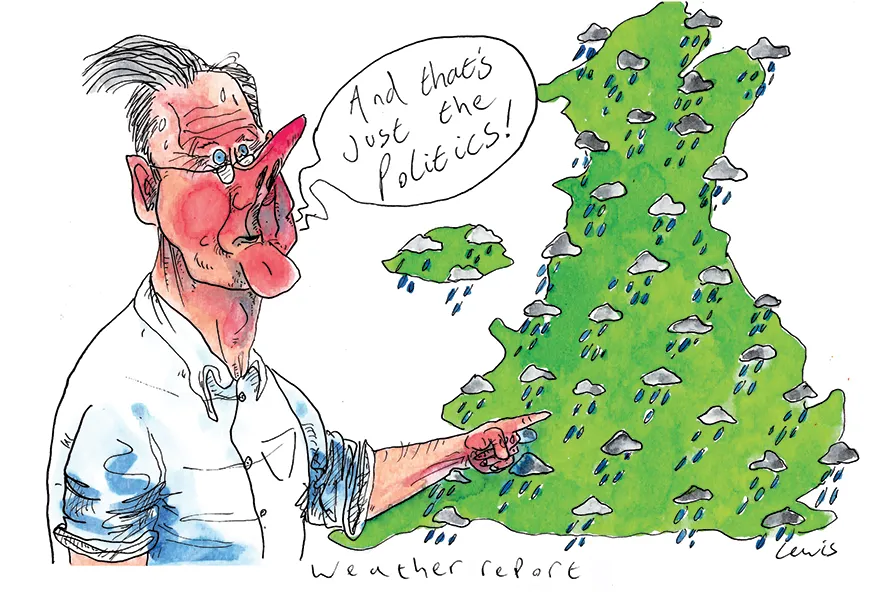John Wojcik pays tribute to a black US activist who spent six decades at the forefront of struggles for voting rights, economic justice and peace – reshaping US politics and inspiring movements worldwide
The collapse of the Atlantic Meridional Overturning Circulation poses an existential threat — but do today’s politicians have the capacity to deliver the more resilient and sustainable economics of tomorrow, wonders ALAN SIMPSON

 Cartoon: Lewis
Cartoon: Lewis
HOW EASY it is to be overwhelmed by trivia. In a faux collision between Tweedle Dum and Tweedle Dee, supporters of Keir Starmer and Wes Streeting fall out over who should lead the Labour Party. At the same time, Donald Trump threatens to sue the BBC over its clumsy revelation of something everyone knows — that the man is an inveterate liar, warmonger and thief.
Meanwhile, hardly anyone picks up on a much bigger global news item.
“Iceland has officially declared the potential collapse of the Atlantic Meridional Overturning Circulation (Amoc) as a national security risk and an existential threat. This is the first time the nation has formally classified a specific climate-related phenomenon as a direct threat to its security and resilience.”
The risk isn’t just an issue for Iceland. The collapse of Amoc could plunge Europe into a new Ice Age and create chaos across global ecosystems.
It follows on from research, published by Imperial College London, concluding that current levels of global heating is also (currently) responsible for one death per minute across the planet.
This may be difficult to digest in a Britain lashed by freak storms and flooding, but it all fits together. We are on a roller-coaster of climate instability that is only going to get worse. But who cares?
Those attending the Earth Summit in Brazil clearly do. But with the big national players/polluters being notable by their absence, the mileage (for the planet) is more limited. Even Britain’s presence is more of an embarrassment than an asset. Britain announced that it can’t afford to contribute to saving Brazil’s rainforests, but that we can pay Drax £1 million a day to cut down (and burn) Canada’s. We are lost in the politics of the absurd.
Back home, the focus is no better. Zack Polanski is doing his bit to revive a genuinely progressive debate within the Green Party. Labour’s readmitted welfare rebels are doing their bit too. But all this is within an avalanche of distractions.
Confusion reigns
In the run-up to the Chancellor’s autumn Budget, the current trend is for officials to leak out possible tax and benefit changes in advance, just to “road test” the public reaction. It gives rise to a wild orgy of speculation. Almost anyone can join in. Opposition parties float alarmist ideas about what the Chancellor plans to do. So too does the press. Ministers have all sorts of crazy ideas thrown at them in interview slots prior to the Budget itself.
For the government, this is often seen as a way of dipping your toe in the water to test the most contentious of ideas before Budget day itself. Little thought is given to whether it is healthy to get caught up in such speculative frenzy, let alone whether it addresses the bigger issues we all face. Often, this task falls to outriders.
This is probably where Jonathon Porritt comes in. Porritt is one of Britain’s best known environmental campaigners and was the founding chair of Labour’s sustainable development commission. But right now he is on a pilgrimage.
Pilgrims of hope
Porritt is touring Britain’s bookshops, universities and climate networks with his book Love, Anger and Betrayal. As well as being a clarion call about the climate emergency it is also a collaborative tribute to those young (and not so young) voices who have ended up in prison for attempting to halt our race into climate oblivion.
If your part of Britain hasn’t heard him (or even booked him!) you should do so immediately.
The book itself invites a reappraisal of who and what we are in these craziest of times. Alongside Porritt’s own flawless analysis there is a stream of cameo comments from those imprisoned for their activism. In some ways, this is the most humbling part of the book.
These are not hardened criminals. Universally, they haven’t ended up in prison for being fraudsters, venal or greedy. Their crimes have all been around confronting the death-spiral that is our obsession with oil. Most are young, kind and bright. Many might have expected to have glittering prospects ahead of them. All, however, ended up in prison for direct action activities designed to save us from ourselves.
Small boats v small minds
How different these prisoners are from the mobs mobilised by the far right; those who would have you believe that our biggest existential threat comes in small boats arriving on the south coast. The truth, however, is that we have become the real asylum-seekers, holed up in our own hostels of ignorance, looking for anyone else to blame for the looming climate crisis we have created.
We also seem to have become immune to all the scientific warnings that surround us.
Look at all the scary global “upticks” of carbon dioxide levels, global temperature changes and the rise in global sea levels. Each one of these brings more destructive upheavals than all the small boats combined.
But still we are more likely to imprison the messengers rather than change the message.
Many years ago, after reading Jared Diamond’s book Collapse analysing the disintegration of whole societies in the past, I struggled to get past their stupidity. How could people on Easter Island not know that when they had cut down all their trees they would be without a source of fuel? Now I see us doing the same. It isn’t that we don’t have other/better choices. We just refuse to see them. And that’s where politics is stuck.
To survive, we will have to embrace a different economics. This is still within our reach — just. But the mantras themselves must change. “Growth, growth, growth” increasingly sounds like Easter Islanders shouting “trees, trees, trees!”
Instead, we need a new economics built around “resilience.” It just doesn’t help when we lock up the voices that might take us there. Water, food, fuel and togetherness must become the cornerstones of tomorrow’s economics, and “resilience” must become their litmus test.
Beyond oil
Forget the race into another global free-for-all. More localised “resilience” systems would take us into a more sustainable economics. Removing all subsidies from oil is a part of the process, but so too is the taxation of casino economics. The answer is not just to tax the rich but to look at the wholesale expropriation of wealth that followed the Thatcher/Reagan retreat from the real economy.
The real challenge is to shift taxation onto the movers of money and to the gamblers who rely on the state bailing them out whenever their speculative orgies crash and burn. As in any epoch-changing moment, this requires clarity, courage, leadership and selflessness.
It doesn’t help if these are the voices we are currently locking up.

As the dollar falters and US power turns predatory, Britain and Europe must abandon transatlantic illusions and build a collectivist alternative before the system implodes, writes ALAN SIMPSON

Olive oil remains a vital foundation of food, agriculture and society, storing power in the bonds of solidarity. Though Palestinians are under attack, they continue to press forward write ROX MIDDLETON, LIAM SHAW and MIRIAM GAUNTLETT

ALAN SIMPSON warns of a dystopian crossroads where Trump’s wrecking ball meets AI-driven alienation, and argues only a Green New Deal can repair our fractured society before techno-feudalism consumes us all











